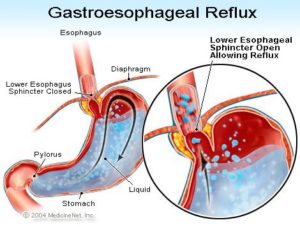
Diagnosed with Cancer? Your two greatest challenges are understanding cancer and understanding possible side effects from chemo and radiation. Knowledge is Power!
Learn about conventional, complementary, and integrative therapies.
Dealing with treatment side effects? Learn about evidence-based therapies to alleviate your symptoms.
Click the orange button to the right to learn more.
- You are here:
- Home »
- Blog »
- side effects ID and prevention »
- Esophageal cancer screening: Unnecessary, Expensive, Harmful?
Esophageal cancer screening: Unnecessary, Expensive, Harmful?

“A group of U.S. internal medicine doctors today recommended limiting esophageal cancer screening to people with chronic heartburn who have additional, more severe symptoms…”
Do you have heart-burn or acid reflux and worry about gastroesophageal reflux disease (GERD) or maybe even esophageal cancer (EC)? Though it is true that GERD or BE increases the risk of EC, the article linked below states that the routine screening known as upper endoscopy, the screening procedure is often used to diagnose and manage gastroesophageal reflux disease (GERD), may be unessecary.
“But some of that use (upper endoscopy) may be unnecessary, the American College of Physicians (ACP) said – adding costs and putting patients at risk of side effects without evidence of a clear benefit. “Not every patient with GERD who comes in should be getting this procedure done,” said Dr. Amir Qaseem, ACP’s director of clinical policy, who co-wrote the guidelines.“
In addition to the risks of side effects and costs, there is no evidence that upper endoscopy testing lowers the risk of dying from esophageal cancer.
“But there’s no evidence that traditional upper endoscopy lowers those risks either, according to the ACP’s Clinical Guidelines Committee.“
I supplement with Life Extension SuperBio Curcumin. This brand of curcumin is more bioavailable and has been evaluated and approved by Consumerlab.com.
I am a cancer survivor and cancer coach. Do you have GERD or Barrett’s Esophagus? To learn more about evidence-based, non-toxic therapies to reduce your risk of esophageal cancer, please scroll down the page, post a question or comment and I will reply to you ASAP.
Thanks
David Emerson
- Cancer Survivor
- Cancer Coach
- Director PeopleBeatingCancer
Recommended Reading:
- Heal Barrett’s Esophagus, GERD and Eliminate Risk of Esophageal Cancer
- If Curcumin heals GERD will it also heal Barrett’s Esophagus?
- Esophageal cancer- Reduce Risk of Relapse with Cruciferous Veggies-
9 Ways Turmeric Benefits In Acid Reflux / GERD
“Research proves that because of turmeric’s anti-inflammatory, anti-microbial, anti-oxidant properties it can not only help prevent Gastroesophageal reflux (GERD) / acidity but can also prove to be beneficial in the treatment and reducing its harmful effects in the body.”
Dial back esophageal cancer screening: internists
“A group of U.S. internal medicine doctors today recommended limiting esophageal cancer screening to people with chronic heartburn who have additional, more severe symptoms.
Known as upper endoscopy, the screening procedure is often used to diagnose and manage gastroesophageal reflux disease (GERD) – which can be tied to a higher risk of esophageal cancer.
But some of that use may be unnecessary, the American College of Physicians (ACP) said – adding costs and putting patients at risk of side effects without evidence of a clear benefit.
“Not every patient with GERD who comes in should be getting this procedure done,” said Dr. Amir Qaseem, ACP’s director of clinical policy, who co-wrote the guidelines.
“It’s a low-risk procedure, but every procedure carries risk of complications,” he told Reuters Health.
During an upper endoscopy, a doctor inserts a flexible tube with a camera, called an endoscope, into the mouth and down the throat. Some patients receive anesthesia beforehand.
Earlier this year, a Reuters Health report suggested another type of screening, transnasal esophagoscopy, is becoming increasingly popular despite a lack of evidence it lowers the risk of dying from esophageal cancer (see Reuters Health story of April 20, 2012: reut.rs/I3mkij)…
In the case of Barrett’s esophagus, in which the esophageal lining is damaged by stomach acid, patients with no signs of cancer shouldn’t be screened more than once every three years, according to the guidelines.
UNNECESSARY COSTS, RISKS
Even among most people with Barrett’s, the risk of cancer is quite low, according to Dr. Lauren Gerson, a gastroenterologist at Stanford University in California who wasn’t involved in the new study.
“Use of upper endoscopy beyond the indications listed here is likely to generate unnecessary costs and expose patients to risks without improving clinical outcomes,” the committee wrote.
In particular, the ACP does not recommend routine screening for women or adults younger than 50, because their risk of esophageal cancer is much lower than that of older men.
An upper endoscopy costs more than $800. Rare side effects include esophageal perforation, pneumonia and breathing problems. False positives could also lead to more unnecessary tests and procedures with their own set of side effects, Qaseem said.
Although the new guidelines are directed at physicians, Qaseem said it’s also important for patients to understand the benefits and limitations of esophageal cancer screening. And people shouldn’t be afraid to ask their doctors why they’re ordering an endoscopy and whether it’s really necessary, he said.
Most cases of GERD, Qaseem added, will not be dangerous and can get better with lifestyle changes, such as weight loss.
“There is evidence that losing weight is effective, not eating late at night is effective, and so-forth,” Gerson told Reuters Health.
“That’s the first recommendation to patients, to try to make lifestyle changes to reduce their GERD symptoms and try to get off medications, if possible.”
SOURCE: bit.ly/R1w1Xu Annals of Internal Medicine, online December 3, 2012.”


